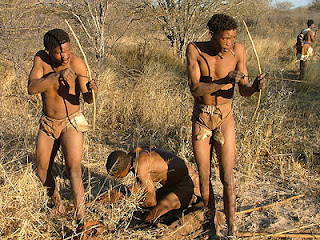I finally finished reading Urban Tribes: Are Friends the New Family?, a book that explores the so-called "marriage delay" among Gen Xers by branding groups of city-dwelling, single, twenty- and thirty-something friends as "urban tribes" and seeking to explain their significance in a post-college, pre-marriage context.
The typical tribe member graduates college, moves far away from mom and dad to an urban core -- San Francisco, Boston, New York, Chicago -- and proceeds to form friendships with other (also often far-from-home) singles. Over time, these friendships become the basis of a tribe, which, in the words of author Ethan Watters, is "an intricate community of young people who live and work together in various combinations, form regular rituals, and provide the support of an extended family." The bonds of the tribe may also play hell with individual members' romantic lives.
My path was a bit different. After college, I moved away from mom and dad to Midland, a decidedly non-urban core and, though I made friends, they were mostly married with children and in their 40s or older. For my part, any "marriage delay" from those years came mainly from the fact that there wasn't much of a singles scene in that godforsaken burg.
But the anecdotal descriptions of various self-described tribes does bear some resemblance to the way I live now. The book was recommended to me by a friend who posited that our group fit the definition, albeit Ann Arbor isn't large enough to be an "urban core." (Of course, I don't live far from mom and dad, either, but most all my Ann Arbor friends do, as distinct from the friends I grew up with in Metro Detroit.) My friends in town are by and large in their late 20s or early 30s, unmarried, and a large chunk of this blog's readership. We all do favors and look out for each other in various ways, but I'd guess our gang is not as tight as some of the groups described in the book.
Some of my friends go on the hunt for more beer.
Anyway, for a bit of pop sociology, Urban Tribes is fairly interesting, although after a while it becomes kind of tedious reading. There's little organization, and the book is 75% Watters recounting what people emailed him about their own tribes and 25% Watters talking about himself and his friends. Anyone looking for a scholarly approach to the marriage delay phenomenon had best look elsewhere.
P.S. I know a bunch of people had asked to borrow it when I was done. I don't remember who you were, but if you're still interested, just let me know. First come, first served.
Sunday, March 04, 2007
Friends, Romans, Tribesmen
Subscribe to:
Comment Feed (RSS)











|